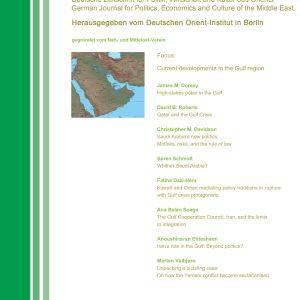Description
The Gulf Cooperation Council was created as a response to Iran’s Islamic Revolution, which stirred unrest across the Middle East, particularly among the region’s Shiite population. The development of the GCC has been marked by its members’ relationship with Iran, but also by fears of Saudi hegemony and by differing attitudes to political Islam. Despite the sectarian and ideological cleavages which are often the focus of attention, the primary driver of foreign policy for regional actors is the need to ensure regime survival.
Ana Belén Soage is Adjunct Professor of Government at Suffolk University (Madrid Campus). She was awarded a European Doctorate in Middle East Studies in 2011, after five years of research in Egypt. Her research focuses on Middle East politics and political Islam, both in the Muslim world and in the West.




Reviews
There are no reviews yet.